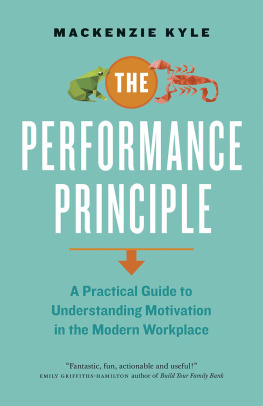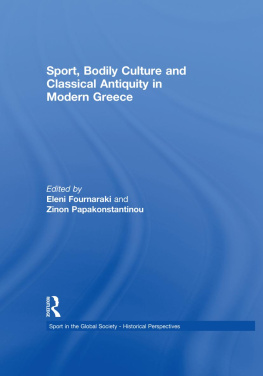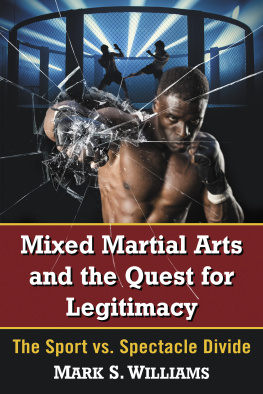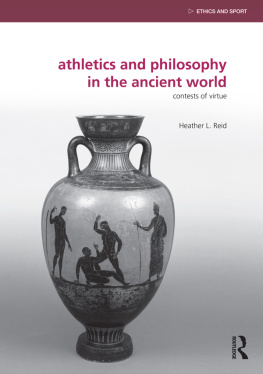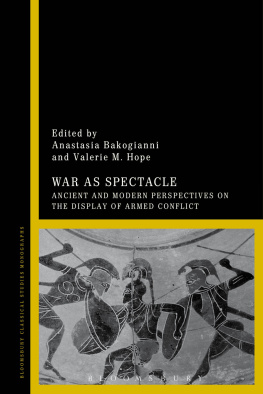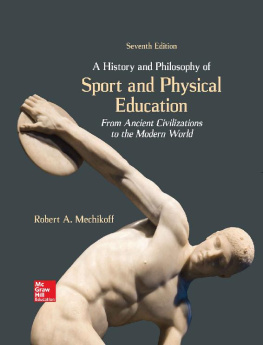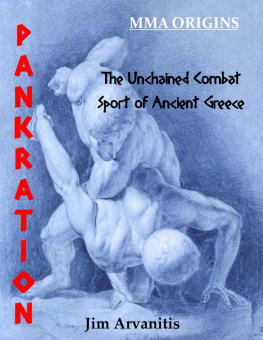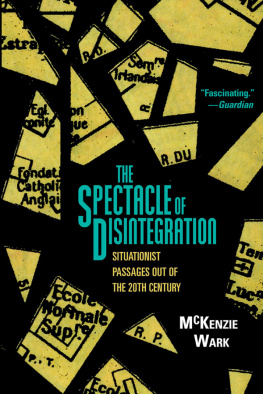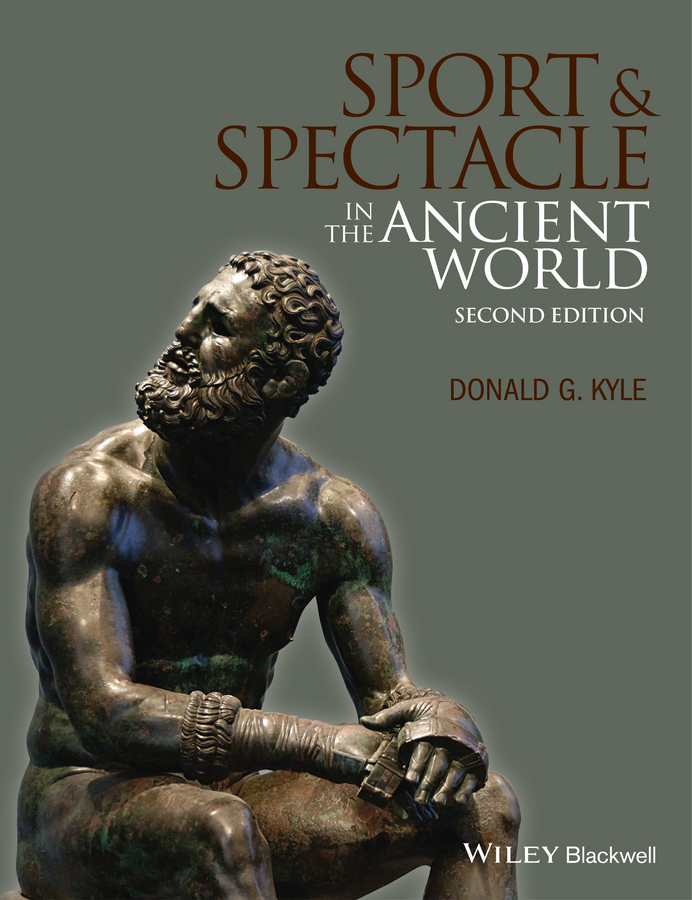
CONTENTS
List of Tables
- Chapter 06
- Chapter 08
List of Illustrations
- Introduction
- Chapter 01
- Chapter 02
- Chapter 03
- Chapter 04
- Chapter 05
- Chapter 06
- Chapter 07
- Chapter 08
- Chapter 10
- Chapter 11
- Chapter 12
- Chapter 13
- Chapter 14
- Chapter 15
- Chapter 16
Guide
Pages
Ancient Cultures
These enjoyable, straightforward surverys of key themes in ancient culture are ideal for anyone new to the study of the ancient world. Each book reveals the excitement of discovering the diverse lifestyles, ideals, and beliefs of ancient peoples.
Published
Sexuality in Greek and Roman Culture
Marilyn B. Skinner
Ancient Babylonian Medicine
Markham J. Geller
The Spartans
Nigel Kennell
Sport and Spectacle in the Ancient World
Donald G. Kyle
Food in the Ancient World
John M. Wilkins and Shaun Hill
Greek Political Thought
Ryan K. Balot
Theories of Mythology
Eric Csapo
Sexuality in Greek and Roman Culture, second edition
Marilyn B. Skinner
Sport and Spectacle in the Ancient World, second editon
Donald G. Kyle
In preparation
Science in the Ancient World
Daryn Lehoux
Ethnicity and Identity in the Ancient World
Kathryn Lomas
Roman Law and Society
Thomas McGinn
Economies of the Greek and Roman World
Jeremy Paterson
Economies of the Greco-Roman World
Gary Reger
The City of Rome
John Patterson
Sport and Spectacle in the Ancient World
Second Edition
Donald G. Kyle
This edition first published 2015
2015 John Wiley & Sons, Inc.
Registered Office
John Wiley & Sons, Ltd, The Atrium, Southern Gate, Chichester, West Sussex, PO19 8SQ, UK
Editorial Offices
350 Main Street, Malden, MA 02148-5020, USA
9600 Garsington Road, Oxford, OX4 2DQ, UK
The Atrium, Southern Gate, Chichester, West Sussex, PO19 8SQ, UK
For details of our global editorial offices, for customer services, and for information about how to apply for permission to reuse the copyright material in this book please see our website at www.wiley.com/wiley-blackwell.
The right of Donald G. Kyle to be identified as the author of this work has been asserted in accordance with the UK Copyright, Designs and Patents Act 1988.
All rights reserved. No part of this publication may be reproduced, stored in a retrieval system, or transmitted, in any form or by any means, electronic, mechanical, photocopying, recording or otherwise, except as permitted by the UK Copyright, Designs and Patents Act 1988, without the prior permission of the publisher.
Wiley also publishes its books in a variety of electronic formats. Some content that appears in print may not be available in electronic books.
Designations used by companies to distinguish their products are often claimed as trademarks. All brand names and product names used in this book are trade names, service marks, trademarks or registered trademarks of their respective owners. The publisher is not associated with any product or vendor mentioned in this book.
Limit of Liability/Disclaimer of Warranty: While the publisher and author have used their best efforts in preparing this book, they make no representations or warranties with respect to the accuracy or completeness of the contents of this book and specifically disclaim any implied warranties of merchantability or fitness for a particular purpose. It is sold on the understanding that the publisher is not engaged in rendering professional services and neither the publisher nor the author shall be liable for damages arising herefrom. If professional advice or other expert assistance is required, the services of a competent professional should be sought.
Library of Congress Cataloging-in-Publication Data
Kyle, Donald G.
Sport and spectacle in the ancient world / Donald G. Kyle. Second edition.
pagescm
Includes index.
ISBN 978-1-118-61356-6 (pbk.)
1.SportsHistory.I.Title.
GV573.K95 2015
796.093dc23
2014024694
A catalogue record for this book is available from the British Library.
Cover image: Bronze statue of boxer from the Thermae of Constantine, 3rd2nd centuries BC. Museo Nazionale Romano, Rome, Italy. Photo Corbis
Preface and Acknowledgments
People often assume that historians of sport must be frustrated former athletes. Perhaps my youthful passions for sport and for antiquity moved me to study ancient sport. Perhaps it was useful that I played sports, enthusiastically if not that successfully. My games certainly taught me things about myself, about life, and about human nature. I remain convinced of the value of sport, especially team sports, for the health of individuals and society. Even as a youth, however, I realized that my recreation, my fun, might be on the playground but that my future lay elsewhere. I never imagined a career applying the life of the mind to the life of the body.
My generation witnessed Vietnam and the rise of modern terrorism, assassinations of inspiring leaders, the Munich Olympic massacre, Olympic boycotts and crises, and scandals of corruption and drugs in professional and college sport. We had to ask ourselves why humans remain aggressive and violent, why sport cannot be free of politics and economics, and why being the victorious competitor or fan seems so important. My generation saw sports news grow from the back page to a whole section of the newspaper. Sports became a larger part of the trinity of the evening newscast, and sports went from Monday Night Football and Hockey Night in Canada to whole channels of sport and more sport.
Why not study things that students find interesting and relevant? We have long followed our interests (e.g., democracy, art, and theater) back to antiquity. Spectacular sports now are more prominent than ever in our media and society. Untold millions associate the Modern Olympics, with their invented traditions and Hellenic trappings, with Ancient Greece. Images of Romes Colosseum and Circus Maximus, of gladiators, beasts, and chariot races, remain pervasive and provocative, but are such topics beneath academics? Do people want to understand Romes games or just to be shocked by them? History is often ugly or sad, but our actions and performances, for good or ill, reveal our human nature.
Ironically, the study of ancient sport has moved from the fringes to the mainstream of ancient studies. Sport and spectacle are ideal subjects for cultural, anthropological, and sociological studies of performance, festivals, ethnicity, identity, body imagery, and eros. Cultural discourse and the construction of social order unquestionably apply to sport and spectacle. Academics tend to privilege the mind over the body, but the physicality and passionate competitiveness of the Greeks and Romans cannot be denied.
When Blackwell invited me to contribute a book to their Ancient Cultures series, I suggested that my Sport and Spectacle (not Sports and Spectacles) should go beyond Greece and include the Near East and Rome to allow me to investigate changes and continuities, contrasts, and comparisons. Deriving from my years of teaching and researching ancient sport, this book contains both new research and echoes of some of my previous works in reduced or revised forms. I hope that whole is greater than the sum of its parts.
Next page

